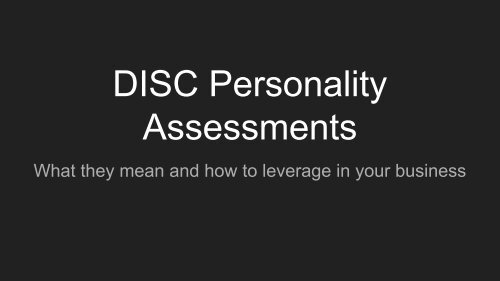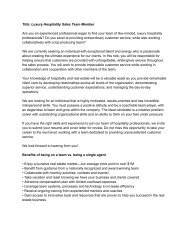Create successful ePaper yourself
Turn your PDF publications into a flip-book with our unique Google optimized e-Paper software.
<strong>DISC</strong> <strong>Personality</strong><br />
<strong>Assessments</strong><br />
What they mean and how to leverage in your business
What does <strong>DISC</strong> stand for?<br />
●<br />
●<br />
●<br />
●<br />
Dominance (Director) - Decisive<br />
Influence (Interactor) - Interactive<br />
Steadiness (Supporter) - Stabilizing<br />
Conscientiousness (Thinker) - Cautious
Why is a <strong>DISC</strong> Assessment and why is it important?<br />
●<br />
It is a behavioural assessment is a tool used to help understand a person's behavior. When we have a<br />
better understanding of who we are, we're able to improve our communication, increase our<br />
productivity, and strengthen our relationships.
D - Dominance (Director)<br />
●<br />
●<br />
●<br />
●<br />
●<br />
●<br />
●<br />
●<br />
Direct and guarded<br />
Wants: to make money, save time, be more efficient<br />
Fears: Being taken advantage of<br />
Seeks: Productivity, Bottom Line<br />
If you’re dealing with a D, be brief and direct, validate your argument with a few carefully selected data<br />
points, and let them take the lead -- within reason.<br />
Styles are direct, goal focused, quick, and decisive. They tend to think of themselves individualistically.<br />
Therefore, D-styles tend to ask questions that affect them directly. They do not want a lot of details, but<br />
just the facts they need to know<br />
What? - What’s the bottom line, ? What’s in it for me?<br />
Fast-paced/outspoken AND questioning/skeptical
I - Influence (Interactor)<br />
●<br />
●<br />
●<br />
●<br />
●<br />
●<br />
●<br />
●<br />
Direct and open<br />
Wants: to have fun, talk about themselves<br />
Fears: Loss of prestige<br />
Seeks: Recognition, Fun<br />
If you’re dealing with an I, be jovial and friendly, focus on the big picture rather than the details, and<br />
strive to provide an interactive experience.<br />
Styles are social, energetic, and talkative. They like to be liked and also to be the center of attention.<br />
Prefer to focus on interactions over tasks. They are all about the people so it makes sense that they<br />
prefer to ask the "who" questions.<br />
Who? - tend to ask questions like, "who's going to be at this meeting?" or "who else is using this?"<br />
Fast-paced/outspoken AND warm/accepting
S - Steadiness (Supporter)<br />
●<br />
●<br />
●<br />
●<br />
●<br />
●<br />
●<br />
●<br />
Indirect and open<br />
Wants: to have security, safety, sense of belonging<br />
Fears: Sudden change<br />
Seeks: Acceptance<br />
If you’re dealing with an S, be relaxed and open, walk them through your proposal step by step, listen to<br />
them, and address their concerns.<br />
Styles are reserved and prefer to have as much understanding as possible before making decisions.<br />
They will ask a lot of questions to make sure the decision is right for them, but also for the people close<br />
to them.<br />
How? - "how are we doing to do this?" or "how is this going to impact us?"<br />
Cautious/reflective AND warm/accepting
C - Conscientiousness (Thinker)<br />
●<br />
●<br />
●<br />
●<br />
●<br />
●<br />
●<br />
●<br />
Indirect and guarded<br />
Wants: practicality, logic, fairness, systematic approach<br />
Fears: Criticism of work<br />
Seeks: Accuracy<br />
If you’re dealing with a C, be tactful and sincere, provide them with in-depth data, and explain the<br />
rationale behind your statements.<br />
Styles are analytical and reserved. They want to know as many facts and data as possible to make the<br />
correct decision. C-styles are cautious and will ask a lot of questions.<br />
Why? - "why does it work this way?" and "why is that step necessary?"<br />
Cautious/reflective AND questioning/skeptical
How to determine someone’s <strong>DISC</strong> personality<br />
●<br />
●<br />
Listen to the types of questions they ask (what, who, how, why)<br />
Determine their core personality traits<br />
○<br />
○<br />
Ask yourself if this person tends to be fast-paced and outspoken (they think fast, walk fast, talk<br />
fast, make decisions fast, etc.) OR more cautious and reflective (they are laid-back, pensive,<br />
slower to make final decisions, speak at a moderate or slow pace, etc.)?<br />
Next, think about whether this person tends to be questioning and skeptical (they have a hard<br />
time believing anything without an abundance of supporting facts or data) OR are they accepting<br />
and warm (they are quick to trust and express affection).
What types of questions do they ask?
What are their primary personality traits?
<strong>Personality</strong> traits for <strong>DISC</strong> personalities


















